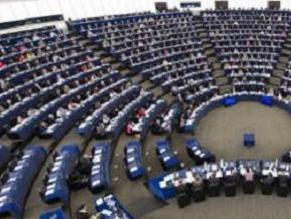|
World Jewish News

During a debate in the monthly plenary session of the European Parliament, several MEPs intervened to express their horror at images emerging from massacres in Syria
|
Syrian President Assad will have to face international justice for crimes against humanity, say MEPs
13.06.2012, Israel and the World Members of the European Parliament expressed deep concern at the situation in Syria but most of them said they prefer political and economic pressure rather than a military intervention “that would have a destabilising impact on the wider region.“
During a debate on Tuesday in the plenary session of the European Parliament, in the presence of EU foreign policy chief Catherine Ashton, several MEPs intervened to express their horror at images emerging from massacres in Syria.
“The images we daily get from men women and children massacred in Syria leave us short of words and we express our solidarity with the Syrian people,” said Ana Gomes, a member of the Group of Progressive Alliance of Socialists and Democrats from Portugal.
“(Syrian President) Assad and his henchmen if they survive will have to face international justice for crimes against humanity and crimes against their people, but the ominous responsibility lies with their backers Russia and China who continue to sell them arms and block un resolutions, feeding in to the Syrian regime and stalling the Annan peace plan,” she added.
A view shared by Polish MEP Michal Tomasz Kaminski:“We should not be surprised by Assad’s actrions He is a dictator and is acting like one. He should be prosecuted for his war crimes, as that is what they are.”
But Socialist MEP Veronique De Keyser asked : “Apart from humanitarian and economic pressure, what could we do?” “Military action would be far more destructive. The Russian response is more worrying. Russia is part of our concerns.”
Independent MEP Andreas Molzer from Austria added: “It’s important to step up pressure on Syria. I do believe however military action would do more harm then good. There is no credible or uniform opposition. Overthrowing the regime would not necessarily lead to better humanitarian conditions, it could lead to more bloodshed as we’ve seen elsewhere in the region, which is something the EU should avoid at all costs.”
British Conservative Charles Tannock expressed a different position: “All options are open to the West including arms embargo and limited military intervention – all options must be on the table to prevent descent into civil warfare,” he said.
“We must enforce an arms embargo in the international community to revent them supplying arms to Syrian regime, first of all starting with Russia, .
Some, like German Green MEP Franziska Katharina Brantner, suggested to strengthen internal opposition to Assad to build stronger links and arrange meetings outside Syria.
Belgian Liberal MEP Frederique Ries stressed that “the Assad regime is becoming more powerful. He is even using children as human shields. Our diplomacy has failed, we need to go further, we need to act differently to make sure these innocent victims have not die in vain and the Syrian regime is brought to fall.”
In her response, EU foreign policy chief Catherine Ashton stressed that the Syrian army “is strong and well-armed so talk of military action needs to be thought extremely carefully in a very complex situation on the ground.”
She concluded: “We have to work step by step, carefully, to try to resolve this situation peacefully. We have to put pressure on the regime, we have to get the opposition to unite, we have to get a ceasefire that will hold.”
by: Yossi Lempkowicz with Shari Ryness
EJP
|
|
